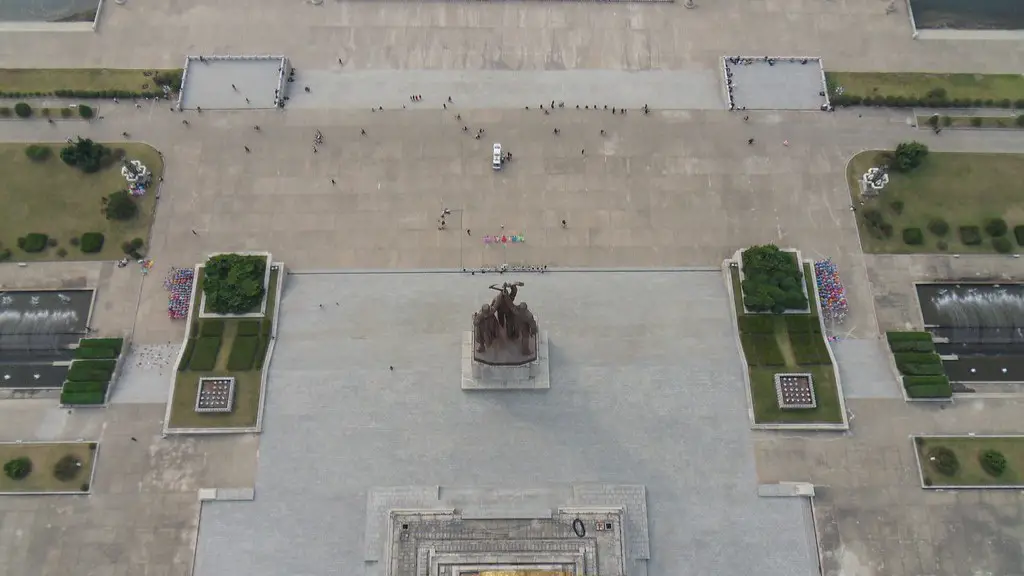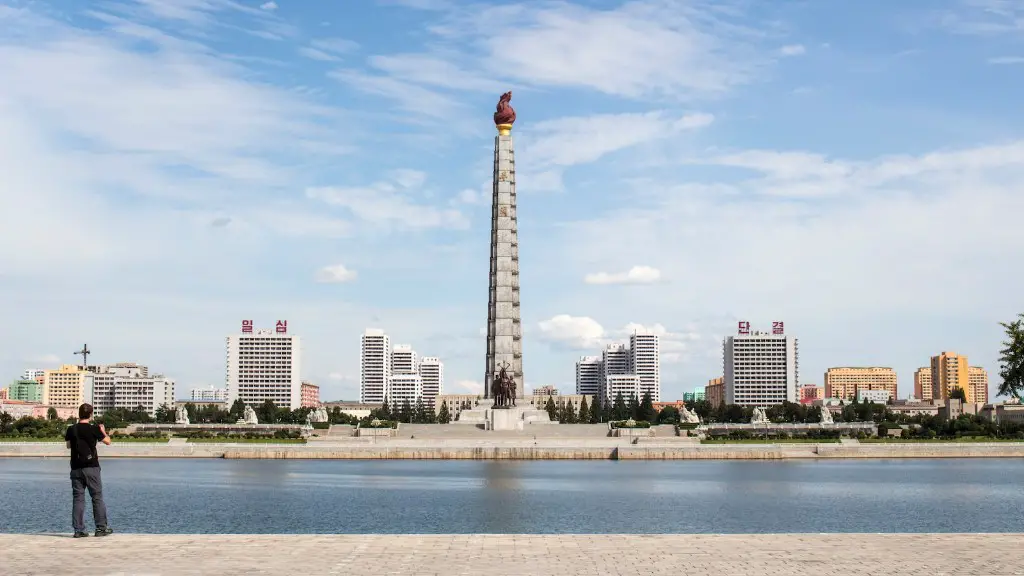Overview of North Korea’s Military Strength
When it comes to North Korea’s military strength, it is hard to say for sure what their capabilities are. It is widely believed that North Korea has one of the world’s largest armies, with a total force of 2.1 million personnel. They also possess a wide range of military capabilities, including chemical and nuclear weapons. As one of the most isolated countries in the world, North Korea has always sought to maintain a strong military presence to protect itself from potential threats.
North Korea’s official military doctrine is characterized by a strong emphasis on self-defence and counter-attack. In a statement from their Ministry of the People’s Armed Forces in 2001, North Korea declared that their military mission would be to “defend the sovereignty and territorial integrity of the country, repel any aggression, and provide protection for the social system and people’s rights”. In terms of their actual capabilities, North Korea has an impressive arsenal, including an estimated 5,000 tanks, 5,500 armoured fighting vehicles, and a vast air force and navy.
As far as nuclear weapons are concerned, North Korea has developed a range of missiles capable of carrying nuclear weapons. In August 2017, they tested their first intercontinental ballistic missile, demonstrating that they possess the capability of launching nuclear weapons across the globe. They also have a long record of testing nuclear weapons, including two tests in 2016 and 2017.
Beyond their nuclear capabilities, North Korea has also demonstrated a commitment to building up their conventional military capabilities. As part of this, they have increased their military spending, with a reported military budget of around $7 billion in 2017, making them one of the top 15 countries in terms of military spending. This spending has enabled them to purchase, build, and develop a wide range of weaponry, from fighter jets to tanks and submarines.
In addition to their conventional weaponry, North Korea has also developed an extensive cyber warfare capability. This includes their infamous Sony Pictures hack in 2014, as well as various online campaigns to influence public opinion in favour of the North Korean regime. They are also believed to have launched multiple cyber attacks against South Korea, which could have the potential to cause significant disruption and chaos in the region.
Overall, North Korea appears to have a military presence that is capable of inflicting significant damage, both in terms of conventional warfare and nuclear capabilities. This has been demonstrated through their multiple tests of both nuclear and conventional weapons, as well as their willingness to invest heavily in military spending to develop their arsenal. This means that they are a force to be reckoned with, both in terms of conventional and nuclear warfare.
North Korea’s Relationships with Other Nations
Although North Korea has a strong military presence, it has become increasingly isolated from the international community over the past few decades. This isolation was largely the result of their pursuit of nuclear weapons, as well as their aggressive rhetoric against other countries. As a result, they have few diplomatic allies, with China being their main partner, followed by Russia, Iran, and Syria. They have also maintained a long-standing feud with the United States, which has led to heightened tensions in the region.
As a result, North Korea has long sought to build up its military strength in order to deter any potential aggressors. This has included the development of their nuclear weapons program, as well as their expansion of conventional military capabilities. This has been primarily aimed towards the United States, who they see as their main rival. Their main goal is to ensure that they are strong enough to deter any potential aggression from other countries, particularly the United States.
However, North Korea’s enhanced military capabilities have also been used to pressure other nations. For example, in 2017, they threatened to “sink” Japan with nuclear weapons and to turn the United States into “ashes and darkness”. These threats have led to heightened tensions in the region, as well as increased sanctions from the international community.
Overall, North Korea’s relationships with other nations have significantly shaped the nature of their military capabilities. Through their threats of violence, they have sought to deter any potential aggression, while also attempting to gain leverage in negotiations with other nations. However, this has also caused a great deal of tension in the region, as many countries are concerned about the potential threat posed by North Korea.
Impact of Sanctions on North Korea’s Military Strength
North Korea’s military capabilities have been significantly impacted by the increasing number of sanctions imposed on them by the international community. In 2017, the United Nations Security Council placed additional sanctions on North Korea in an attempt to force them to abandon their nuclear weapons program. These sanctions have had a serious impact on the North Korean economy, leading to a decrease in the amount of money available for military expenditures.
This has had a significant impact on their military capabilities, as they have been unable to purchase, build, and develop new weapons. In addition, the availability of supplies, such as spare parts and fuel, has become increasingly limited, which has hindered the operation of their existing military forces. This has caused them to be less able to defend themselves against potential threats and to maintain a strong military presence.
However, it is important to note that North Korea has been able to maintain a strong military presence, despite the impact of the sanctions. They have managed to secure a sufficient amount of funding to purchase a range of military equipment, including fighter jets, tanks, and submarines. They have also demonstrated their nuclear capabilities through multiple tests, showing that they are still a potent force to be reckoned with.
Overall, the sanctions imposed on North Korea have had a negative impact on their military capabilities, leading to a decrease in the money available for military expenditures and a limited availability of supplies. However, they have still managed to maintain a reliable and capable arsenal of weapons, which has enabled them to effectively defend their nation and deter potential aggression.
North Korea’s Military Strategy and Tactics
North Korea has long employed a range of military strategies and tactics in pursuit of their goals. This has included the use of nuclear weapons, which they have tested multiple times, as well as conventional military capabilities, such as their extensive arsenal of tanks and fighter jets. In addition, they have also employed a range of unconventional tactics, such as cyber warfare and propaganda campaigns, which they have used to attempt to influence public opinion.
North Korea’s official military strategy is centered around a strong defense, with a primary focus on deterring any potential aggression from other countries. Additionally, they have sought to develop their military capabilities to such a level where they can effectively retaliate against any attack. This is exemplified by their nuclear weapons program, which is aimed at providing them with the capability to launch a nuclear strike against targets around the world.
In addition to this, North Korea has also sought to develop their conventional military capabilities to a level that allows them to effectively defend their country. This has led to a focus on developing their air force and navy, both of which are capable of confronting potential threats. In addition, they have also sought to develop their ground forces, investing in a wide range of tanks and armoured fighting vehicles.
Overall, North Korea has sought to develop a wide range of military capabilities, both conventional and unconventional. This has been seen through their extensive military spending, their pursuit of nuclear weapons, and their willingness to employ unconventional tactics, such as cyber warfare, to achieve their goals.
Impact of Covid-19 on North Korea’s Military Strength
The Covid-19 pandemic has had a significant impact on North Korea’s military capabilities, in terms of both personnel and spending. As their economy has been decimated by the virus, their military budget has been reduced, leading to a decrease in the amount of money available for weaponry, supplies, and training. This has reduced their ability to maintain their military presence and to respond to potential threats.
In addition, the pandemic has led to a decrease in the number of personnel available for military service, as many people have been forced to stay home due to the health crisis. This has decreased the size of the North Korean Army and reduced their ability to respond to any potential threats. Furthermore, the number of international troops and personnel stationed in the region has also been reduced, making it more difficult for North Korea to effectively deal with any potential aggression.
Overall, the Covid-19 pandemic has had a significant impact on North Korea’s military capabilities, reducing the amount of money available for military expenditures, as well as the number of personnel available for service. This has weakened their defensive capabilities and decreased their ability to respond to any potential threats.
Conclusion
In conclusion, North Korea has a formidable military presence, which includes both nuclear and conventional capabilities. They have developed an extensive arsenal of weapons, from tanks and fighter jets to cyber warfare and propaganda campaigns. They have also maintained a strong military doctrine of self-defence and deterrence. However, the Covid-19 pandemic has had a significant impact on their military capabilities, reducing the money available for expenditures and decreasing the number of personnel available for service.




